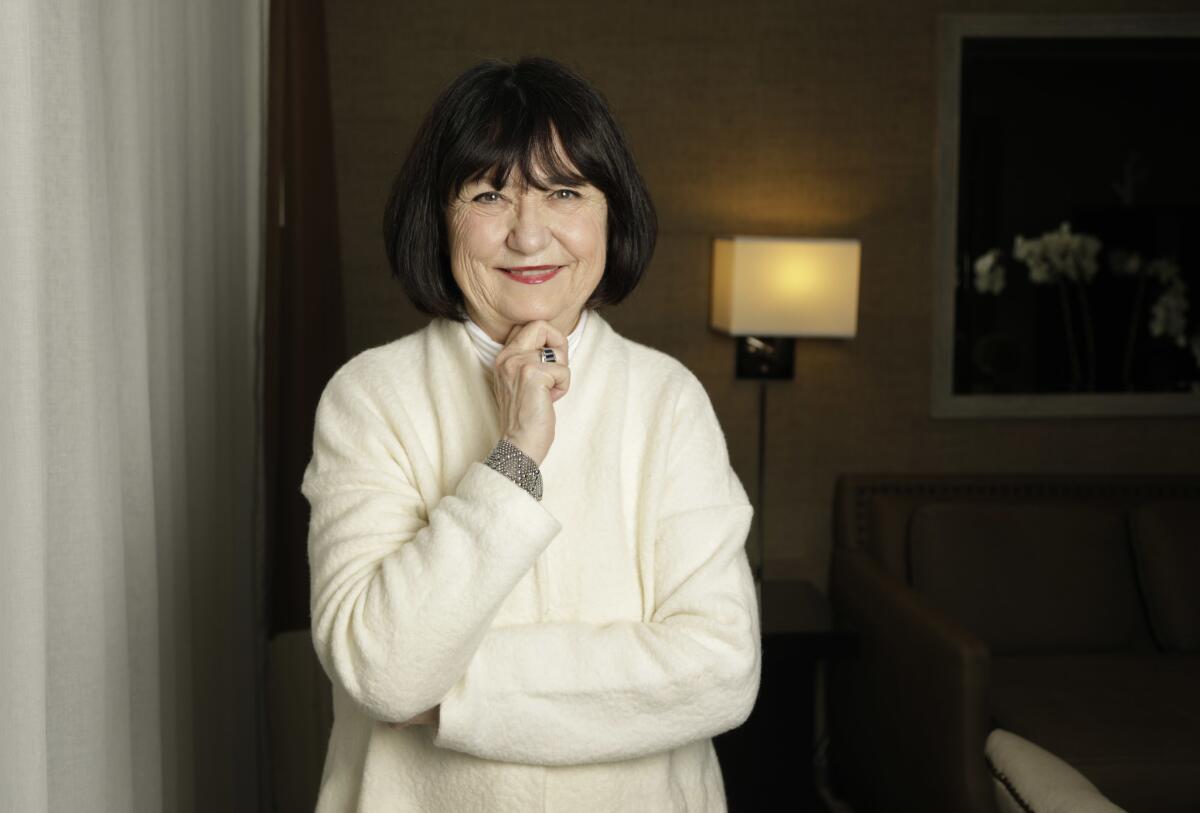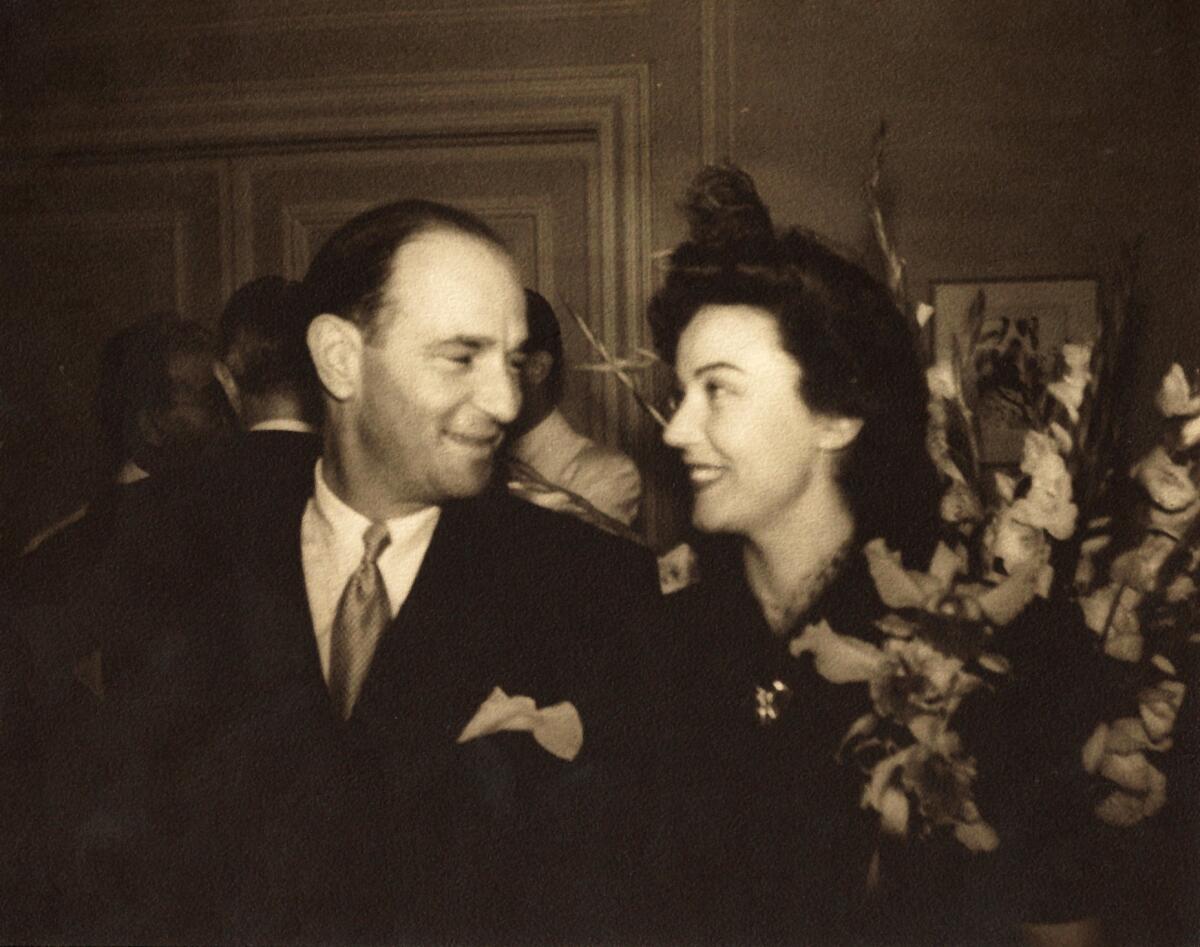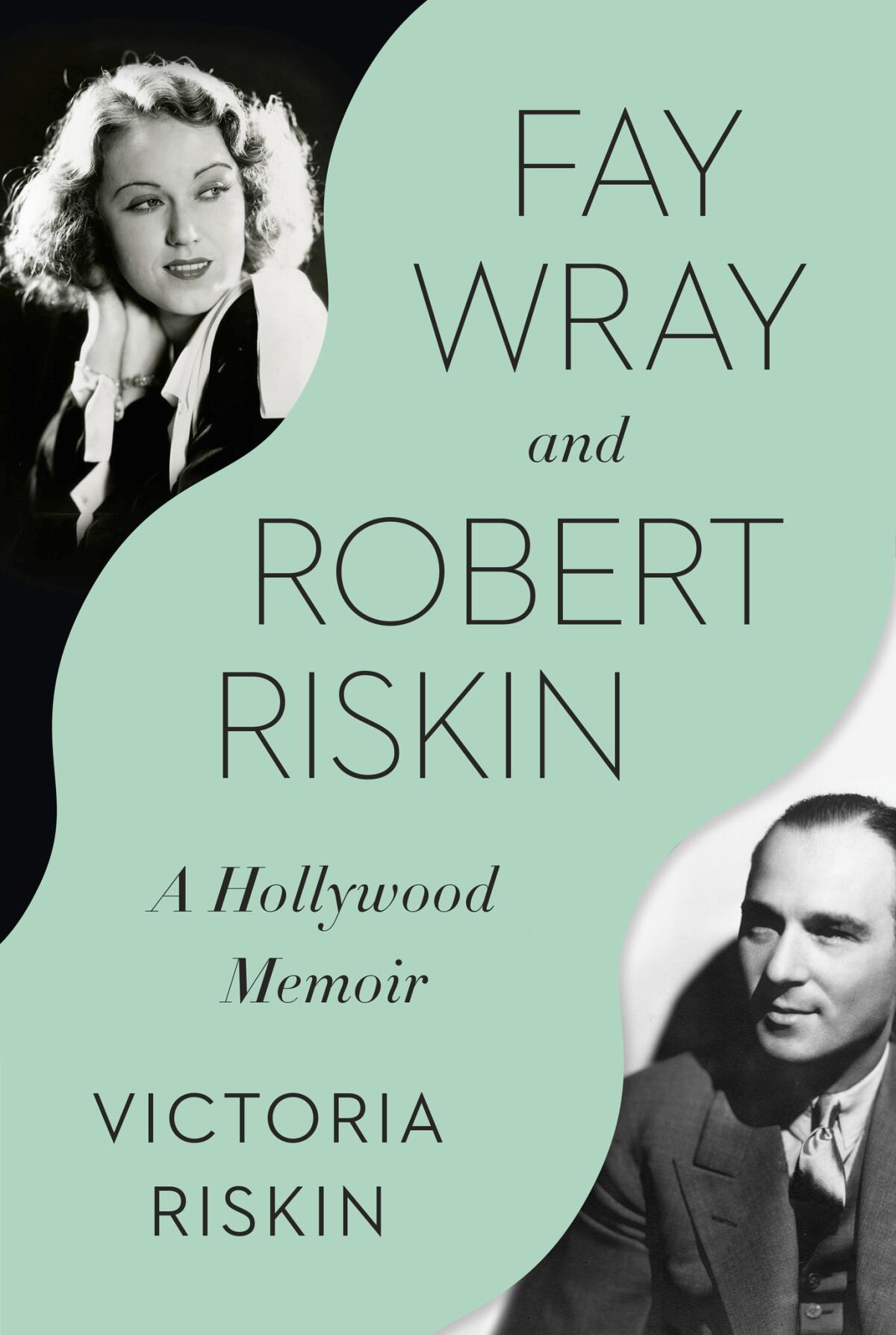Beyond King Kong: Victoria Riskin shares untold stories of her parents Fay Wray and Robert Riskin
- Share via
Actress Fay Wray (1907-2004) had a hard-scrabble early life growing up in a poor Mormon family in Salt Lake City, Utah. She was just 14 when she came to Hollywood with hopes of getting into movies. Not only did she become a star, Wray became an icon as Ann Darrow, the object of the affections of the giant beast in the 1933 masterpiece “King Kong.”
Writer Robert Riskin (1897-1955) hailed from New York’s Lower East Side, the son of Jewish immigrant parents. He arrived in Hollywood in 1930 and found Oscar-winning success with his several collaborations with director Frank Capra. Their works throughout the 1930s included “It Happened One Night,” for which he won the Academy Award, “Mr. Deeds Goes to Town” and “You Can’t Take It With You.”
Riskin and Wray met at a party in 1940 and married two years later. Their marriage was something of a fairy tale until he suffered a devastating stroke in 1950 and died five years later. But she picked up the pieces and returned to work to take care of her three children.
And now their daughter Victoria Riskin, 73, has written an inspired book about her parents, “Fay Wray and Robert Riskin: A Hollywood Memoir.”
Riskin followed in her father’s footsteps. An award-winning producer and writer, she was president of the Writers Guild of America West. Riskin, who lives in Martha’s Vineyard with her husband, writer David W. Rintels, spoke with The Times during a recent visit to Los Angeles. The interview has been condensed and edited.

Reading your book, I began to yearn for the day when people wrote letters to each other. Your father’s love letters to your mother are extraordinary.
The big discovery for me in doing this book was reading the letters that my father wrote. His personality comes through, his worries, his love and his affections — all the issues going on. There’s one that was 26 pages. His whole self was poured into those letters. For many, many years I could not read them.
Why?
She gave them to me several years before she died, which was wonderful of her to hand them over to me. I missed him so terribly when I read the letters. But he came alive in the most wonderful way. I had very little time with him. And it was sort of golden time, magic time. He was a kind of warm, dear and funny person. I noticed all of the photographs of my father with my brother and me, he was always kneeling down so he could look at us eye-to-eye. He was always right there with us.
They both needed each other.
She was longing for that person who would make her feel whole, completely whole. They found each other at just the perfect moment. They had a sense of purpose together. One was to be to be together, the other was to have children and make a family. But, also, to do whatever they could for the war effort.

I feel that director Frank Capra made his best films with your father.
My father believed people were basically good. He loved getting to know people. He loved their idiosyncrasies. He loved what made them tick. He looked for things that were interesting about them, not necessarily fame or fortune, the little touches of life. His theme, as you can tell, was that it’s not bad to be rich, but it doesn’t make you happy necessarily.
Like with “You Can’t Take It With You” and “It Happened One Night”
Right. In “It Happened One Night,” she’s trying to be a rebel against this gilded cage that she lives in. His view was that if people just pitched in together, they could solve all the problems that they have and that these divides are false. It’s so much a theme for today.

Your mother is best known for playing the “beauty who killed the beast” in 1933’s “King Kong.” But have you found that people don’t know her for any of her other films, including Erich von Stroheim’s silent 1928 masterpiece, “The Wedding March”?
It was a mixed blessing because if I say to people today “my mother was Fay Wray” even young people know who she was because it’s the film that endured. On the other hand, the film doesn’t show the breadth of her talent. She made over 120 films, starting in silent films all the way through television. I have had a chance to see some of those films. She’s funny in some of them. One or two I didn’t like her at all. She had a pretty steady career through the ’30s. There were actresses who had ups and downs, but she worked pretty constantly until the end of the ’30s. I think it’s because audiences liked her.
It seems everybody liked her. The two times I interviewed her, she was spunky, funny and sweet.
She was very well liked by the people on the crew and the set. That’s a big deal. People took care of her. She had a way of making you feel good to be in her presence.
My heart went out for your mother with her first marriage to Oscar-winning screenwriter John Monk Saunders, who openly cheated on her, had a horrible problem with alcoholism and then took all of her money and kidnapped their baby daughter Susan.
She didn’t talk a lot about him except toward the end of her life. I found in some of her personal notes that she felt she had let him down. She knew she was stronger. She knew she was caring and didn’t find that key to open the door to saving him. She felt that she should have been able to help him, and she couldn’t. He was beyond help. My mother was very loyal to him. She was quite a devoted person by nature.
Your mother basically retired after she married your father but had to return to work after he became ill in 1950 and died five years later.
I remember her sewing my name tags onto my clothes so I could go to summer camp. She was doing all of that and then trying to keep it all together and make money to pay the rent and take care of us. I missed the life we had, but I never felt she denied my anything. We used to sit together after school, and she would tell my fortune. I think she didn’t want to burden her children with whatever was she was going through. We all felt this great big hole in our lives that we had lost this wonderful man. I think she wanted to keep us buoyed up. She had tremendous character.
Your father and Capra had a unique relationship, I didn’t know Capra suffered from dark depressions and didn’t even visit your father when he was sick or attend his funeral.
I think [Capra] was a complicated man. He had a great sense of humor, wonderful sense of timing. I believe my father brought the best of Frank’s nature out when they were together. They were good pals that way. I think my father understood Frank in a way no one else did, except Frank’s wife, who was very devoted to him.
My father loved America and wanted to pull it up by its bootstraps and help. My father had certain things he wanted to say, and he was passionate about them.
::
Victoria Riskin
Pantheon, 416 pp., $30
Sign up for our Book Club newsletter
Get the latest news, events and more from the Los Angeles Times Book Club, and help us get L.A. reading and talking.
You may occasionally receive promotional content from the Los Angeles Times.






